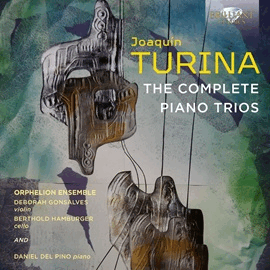 Rimembranza; Mozart: Variationen KV 265; Klaviersonate Nr. 8 a-moll KV 310 + Schubert: Klaviersonate a-moll D. 784; Impromptus D. 899 Nr. 2 & 3 + Schubert / Liszt: Ständchen aus Schwanengesang D. 957 + Andrea & Ennio Morricone: Love Theme aus Nuovo Cinema Paradiso; Sophie Pacini, Klavier; 1 CD Avenir Records AVE 301; Aufnahme 06/2019, Veröffentlichung 04/09/2020 (76'54) - Rezension von Remy Franck
Rimembranza; Mozart: Variationen KV 265; Klaviersonate Nr. 8 a-moll KV 310 + Schubert: Klaviersonate a-moll D. 784; Impromptus D. 899 Nr. 2 & 3 + Schubert / Liszt: Ständchen aus Schwanengesang D. 957 + Andrea & Ennio Morricone: Love Theme aus Nuovo Cinema Paradiso; Sophie Pacini, Klavier; 1 CD Avenir Records AVE 301; Aufnahme 06/2019, Veröffentlichung 04/09/2020 (76'54) - Rezension von Remy Franck
Die jetzt beim neuen Label Avenir herausgekommene CD der Pianistin Sophie Paccini beginnt mit einer faszinierenden Interpretation der zwölf Variationen über das französische Volkslied Ah, vous dirai-je, Maman!. Ich kenne keine bedeutsamere Interpretation dieses Mozart-Werks. Aus den oft nur verspielt und leicht dargebotenen Variationen macht Pacini eine äußerst mitteilsame Komposition.
Nicht weniger gut gelingt es der Pianistin, in der a-Moll-Sonate KV 310 die Musik für sich selbst sprechen zu lassen, kontrastreich und von einer erstaunlichen Entschlossenheit, mit ihrer Sicht der Dinge dem Werk eine große Reife und Ernsthaftigkeit zu geben.
Schuberts Sonate D. 784 stammt aus einer Zeit, in der der Komponist wusste, dass er an unheilbarer Syphilis litt. Die Musik verbindet Lieblichkeit mit grüblerischer Düsterkeit. Die Stimmungswechsel werden packend realisiert und das Drama des Eröffnungssatzes der a-Moll-Sonate wird zwischen dunkel und nachdenklich sehr schmerzlich. Die wunderbare, auf- und abwärts gleitende Melodie im Andante erreicht eine atemberaubende Konzentration der Hoffnungslosigkeit. Die Antwort darauf ist im Finale sehr erregt.
Pacinis Darbietung der beiden Impromptus ist nicht weniger ausdrucksvoll und führt zu einer gefühlvollen Interpretation des Schubertschen Ständchens und dem Liebesthema von Andrea und Ennio Morricone aus dem Film Nuovo Cinema Paradiso, mit dem die durchgehend sehr berührende CD reflektiv zu Ende geht.
Released on the new Avenir label, Sophie Paccini’s new CD begins with a fascinating interpretation of the Twelve variations on the French folk song Ah, vous dirai-je, Maman!. I know of no more significant interpretation of this work. While the Variations are often only playfully and easily performed, she presents them as an extremely communicative composition.
Sophie Pacini is no less successful in the A minor Sonata KV 310. She lets the music speak for itself, full of contrasts and with an astonishing determination, to give the work a great maturity and seriousness.
Schubert’s Sonata D. 784 comes from a time when the composer knew that he was suffering from incurable syphilis. The music combines sweetness with brooding gloominess. The mood changes are grippingly realised and the drama of the opening movement of the A minor Sonata becomes very painful between dark and contemplative passages. The wonderful, up and down gliding melody in the Andante reaches a breath-taking concentration of hopelessness. The response in the finale is all the more agitated.
Pacini’s performance of the two Impromptus is no less expressive and leads to a soulful interpretation of Schubert’s Ständchen and Andrea and Ennio Morricone’s love theme from the film Nuovo Cinema Paradiso, with which the consistently very touching CD ends reflectively.


















